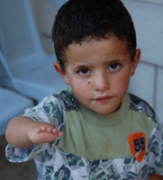
West Bank (MNN) — It's taken a while longer than expected, but CURE International broke ground for their new state-of-the-art teaching hospital in Bethlehem.
They plan to start building in the early part of 2008. It generally takes 12 to 14 months to complete such a project. During the building phase, they will send in medical teams to do some work and assess the needs as they go in order to fine-tune the hospital so it meets the specific needs of the area.
In its completion, Jewish, Christian, and Muslim doctors will work side-by-side to treat children with complex medical needs. "There is nothing like that in Bethlehem or in the West Bank at all," said Scott Harrison. The four surgical needs they will focus on
are orthopedic, neurological, reconstructive cardiac surgery, and plastic surgery for facial deformities and burn victims.
As far as security, Harrison said, "The first thing we have to expect is that it's going to be changing rapidly; sometimes for the better, and unfortunately, sometimes for the worse. We've been trying to get the hospital up and running for three years now, and just in that time, Hamas has won an election." If control of the area were to change, it would be very difficult for them to work there since Hamas is designated as a
terrorist organization.
"That's a risk that comes with hospitals in various parts of the world, and the people that volunteer to go there are well aware of it. We try to mitigate that risk, but at the end of the day, if someone's willing to commit suicide themselves in the process of destroying others, it's been very difficult avoiding assassination," said Harrison.
However, the opportunities for sharing the Gospel are many. Harrison said, "We find that these people are very receptive to working with us and re-appraising what Christianity is when we offer to pray with them for the health of their children. And then, in a very non-confrontational, culturally-sensitive way, demonstrate to them what the message of Christ was."
Harrison said there is more and more a need for the recognition of the importance of the
individual in breaking stereotypes to create peace, especially between jihadists and the West. "We have, as individual citizens of the world, an obligation to do what we can to change that. And as is often the case, it may be, ultimately, collectively, all of us working to
be more effective than what government treaties and others can do."

